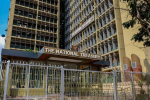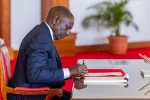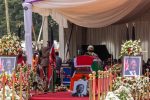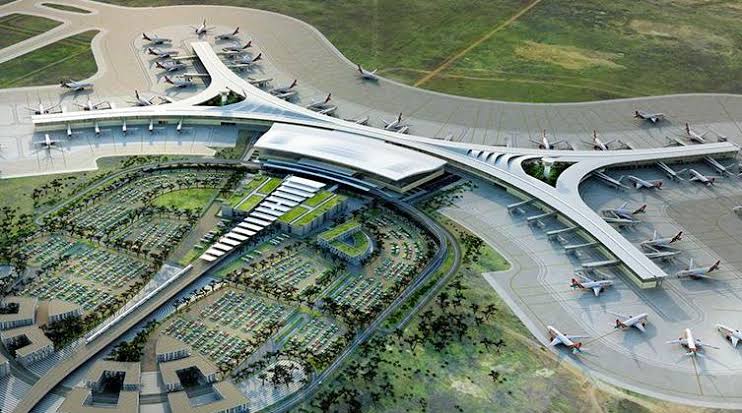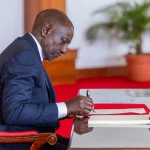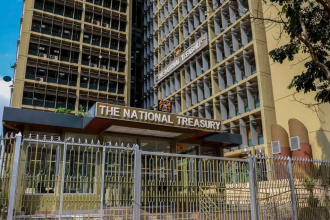The Kenya Airports Authority (KAA) found itself in the hot seat on Thursday as the National Assembly’s Public Investments Committee grilled its management over questionable financial dealings tied to the long-stalled Greenfield Terminal project at Jomo Kenyatta International Airport (JKIA).
The session, chaired by Pokot South MP Hon. David Pkosing, unearthed deep-seated concerns about financial accountability, with KAA struggling to justify over Sh4.3 billion in payments linked to a project that has yet to materialise.
The Greenfield Terminal project, launched in 2013 as part of Kenya’s Vision 2030 flagship initiatives, was intended to transform JKIA into a regional aviation hub by expanding its capacity to handle 20 million passengers annually.
The project gained prominence when President Uhuru Kenyatta officiated its groundbreaking ceremony in 2014, a symbolic event meant to signal Kenya’s ambition to modernise its infrastructure.
However, more than a decade later, the project remains a glaring example of mismanagement, with billions of shillings spent and little to show for it.
The Auditor General’s report, covering KAA’s accounts from 2018/2019 to 2021/2022, flagged irregular payments totaling Sh4.5 billion.
Of this, Sh4.31 billion was advanced to the main contractor, a joint venture between China’s Anhui Civil Engineering Group (ACEG) and China Aero Technology International Engineering Corporation (CATIC), known as ACEG/CATIC JV.
An additional Sh216 million was paid to the consulting firm Louis Berger JV Runji and Partners, with no evidence of work completed by June 30, 2019.
Another Sh7.4 million was disbursed to PricewaterhouseCoopers (PwC) after its contract for technical advisory services was terminated under murky circumstances.
The Groundbreaking Scandal
One of the most contentious issues raised during the session was a Sh75 million payment for the 2014 groundbreaking ceremony, which KAA labeled as a “contract variation.”
Committee members, including Kaloleni MP Katana Paul Kahindi, expressed outrage at the categorisation, arguing that ceremonial expenses should not be treated as project variations.
“How can there be such a huge variation in the cost of a project that hasn’t even started?” Kahindi demanded, calling for those responsible to be held accountable to deter future misuse of public funds.
KAA’s Acting Managing Director, Nicholas Bodo, defended the expenditure, stating that the groundbreaking event—attended by the Head of State—required logistical preparations not initially budgeted for.
He claimed the costs were covered using contingency funds within the contract and were approved by the tender committee in compliance with the Public Procurement and Disposal Act (PPADA) of 2005.
However, the explanation failed to convince the committee, with Pkosing questioning why such a significant amount was spent on an event for a project that remains incomplete.
History of Financial Missteps
The Greenfield project’s troubles are not new. A 2015 investigation by the Ethics and Anti-Corruption Commission (EACC) revealed a Sh9 billion variance in the project’s contract, leading to the suspension of four senior KAA managers on corruption allegations.
The project was eventually canceled, sparking a legal battle with the contractor, who demanded compensation for work already done and loss of anticipated profits.
The cancellation could cost Kenyan taxpayers up to Sh20 billion if the contractor, ACEG/CATIC JV, prevails in arbitration. The contractor has already claimed Sh4 billion in addition to the Sh4.3 billion paid, citing monthly overheads of Sh45 million during the project’s hiatus.
The contract’s terms further complicate matters. If enforced in the contractor’s favor, KAA may be barred from undertaking a similar project for six years without the contractor’s approval, a clause that could stifle JKIA’s much-needed expansion.
Accountability in Question
Committee members expressed frustration at the lack of accountability for the financial discrepancies.
Pkosing inquired whether the members of the organizing committee for the 2014 groundbreaking event were still at KAA, only to be informed by Bodo that most had left the organization since the issue dates back over a decade.
Nyeri Town MP Duncan Mathenge warned that without urgent action, such issues could recur, while Laikipia East MP Mwangi Kiunjuri suggested that many of the audit queries may have originated from KAA’s board, which has the mandate to oversee management decisions.
KAA’s defense of the Sh4.31 billion advance payment—that it was part of the contract’s advance payment clause backed by a valid guarantee and later recovered during mediation—did little to assuage the committee’s concerns.
The lack of tangible progress on the ground, coupled with the significant sums disbursed, paints a picture of systemic failures in oversight and procurement processes.
The Greenfield Terminal saga underscores broader challenges in Kenya’s public procurement landscape, where ambitious infrastructure projects often fall prey to mismanagement and corruption.
The project’s failure not only jeopardizes JKIA’s ability to meet growing passenger demand but also erodes public trust in government institutions tasked with managing taxpayer funds.
With the Kenyan government targeting 25 million passengers annually through JKIA by end of this year, the stakes are high to resolve these issues and chart a path forward for the airport’s expansion.
